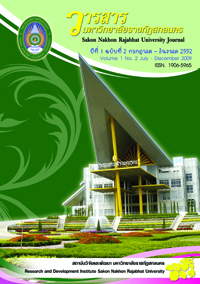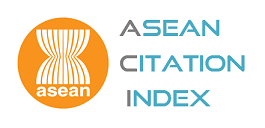การพัฒนาหลักสูตรสถานศึกษาปฐมวัย ตามแนวทฤษฎีพหุปัญญา
Abstract
บทคัดย่อ
การวิจัยนี้มีวัตถุประสงค์เพื่อ 1) พัฒนาหลักสูตรสถานศึกษาปฐมวัยตามแนวทฤษฎีพหุปัญญาโดยใช้ การวิจัยปฏิบัติการแบบมีส่วนร่วม และ 2) ศึกษาผลของการใช้หลักสูตรสถานศึกษาปฐมวัยตามแนวทฤษฎี พหุปัญญา กลุ่มตัวอย่างที่ใช้ในการวิจัย คือ นักเรียนชั้นอนุบาลศึกษาปีที่ 1/1 โรงเรียนเมืองเด็กดี จำนวน 18 คน ภาคเรียนที่ 1 ปีการศึกษา 2549 ซึ่งได้มาจากการเลือกแบบเจาะจงและเป็นห้องที่ครูประจำชั้นยินดีเป็น ผู้ร่วมวิจัย เครื่องมือที่ใช้ในการวิจัย คือ หลักสูตรสถานศึกษาปฐมวัยตามแนวทฤษฎีพหุปัญญา แผนการจัด ประสบการณ์ แบบสังเกตพฤติกรรม แบบบันทึกสนาม แบบสัมภาษณ์ความคิดเห็นของนักเรียนเป็นกลุ่ม แบบสัมภาษณ์ความคิดเห็นของนักเรียนเป็นรายบุคคล แบบสัมภาษณ์ความคิดเห็นของผู้บริหารโรงเรียน ครู และผู้ปกครอง แบบสัมภาษณ์ความคิดเห็นของนักเรียนจากภาพถ่ายกิจกรรม แบบบันทึกการสนทนากลุ่ม แบบประเมินอารมณ์ แบบประเมินชิ้นงาน และสังคมมิติ วิเคราะห์ข้อมูลเชิงคุณภาพโดยการวิเคราะห์เนื้อหา วิเคราะห์ข้อมูลเชิงปริมาณโดยการวิเคราะห์ค่าความถี่ ค่าเฉลี่ย และค่าร้อยละ
ผลการวิจัยพบว่า 1) การพัฒนาหลักสูตรสถานศึกษาปฐมวัยเพื่อส่งเสริมพหุปัญญาของนักเรียน ระดับปฐมวัยทำให้ได้มาตรฐานคุณลักษณะที่พึงประสงค์ของโรงเรียน โครงสร้างหลักสูตร คำอธิบายมวล ประสบการณ์ หน่วยการเรียนรู้และแผนการจัดประสบการณ์ที่เชื่อมโยงกับพหุปัญญา 2) การนำหลักสูตร สถานศึกษาปฐมวัยที่พัฒนาขึ้นมาใช้ได้ผล 2 ประเด็น ประเด็นที่ 1 คือ ผลการพัฒนาพหุปัญญาของนักเรียน ปฐมวัยพบว่า นักเรียนทุกคนมีการพัฒนาพหุปัญญาตามมาตรฐานคุณลักษณะที่พึงประสงค์ของโรงเรียนเพิ่มขึ้น ทุกด้านอย่างต่อเนื่อง ยกเว้นปัญญาด้านการเข้าใจชีวิต นักเรียนส่วนใหญ่มีคะแนนเฉลี่ยอยู่ในระดับควรปรับปรุง และไม่เพิ่มขึ้น ประเด็นที่ 2 คือ ผลการแสดงความคิดเห็นของผู้บริหาร ครู และผู้ปกครองพบว่า ทุกฝ่ายมีความพึงพอใจต่อหลักสูตรสถานศึกษาปฐมวัยที่พัฒนาขึ้น และมีความเห็นว่าหลักสูตรมีความสอดคล้อง กับปรัชญาการศึกษาปฐมวัย วิสัยทัศน์ ภารกิจ เป้าหมาย บริบทของโรงเรียนและชุมชน เด็กปฐมวัยมีพัฒนาการ ที่ดีขึ้นอย่างเห็นได้ชัด
Abstract
The objectives of this research were 1) to develop an early childhood curriculum based on the theory of Multiple Intelligences by using participatory action research; 2) to study the curricular implementation. The samples of the research were eighteen pre-school children of kindergarten class 1/1 who studied in the first semester of academic year 2006 at Muang Dekdee School. The samples were selected by using purposive sampling. The class teacher of these eighteen students was willing to be the co - researcher. The instruments used in this research included the early childhood school curriculum based on the Theory of Multiple Intelligences, lesson plans, behavior observation forms, field notes, interview forms for student groups’ opinions and individual students’ opinions, interview forms for comments about the pictures of an activity in which each student has participated, interview forms for the school administrator, the class teacher and parents’ opinions, forms for recording focus group discussion, documentary datas, emotion evaluation forms, work performance evaluation forms, and sociograms. Content analysis was used for qualitative data analysis. Frequency, mean and percentage were used for quantitative data analysis.
The results of the research showed that: 1) Developing the early childhood school curriculum enhancing pre-school children multiple intelligences has determined the standards of school desired characteristics, curriculum framework, theme description, course syllabus, learning units, and lesson plans, all of which were based on the Theory of Multiple Intelligences. 2) The implementation of the developed early childhood school curriculum has shown significant improvement in two aspects: First, according to the school desired characteristics, every student showed a continuous increase in all multiple intelligences except in existential intelligence in which the average score of most students needed improving but it did not increase. Second, according to their opinions, the administrator, the class teacher and parents were satisfied with the developed curriculum and agreed that the developed curriculum was consistent with the philosophy of early childhood education, vision, mission, goal, school and community context of the school. The early childhood school children’s development was evidently improved.








